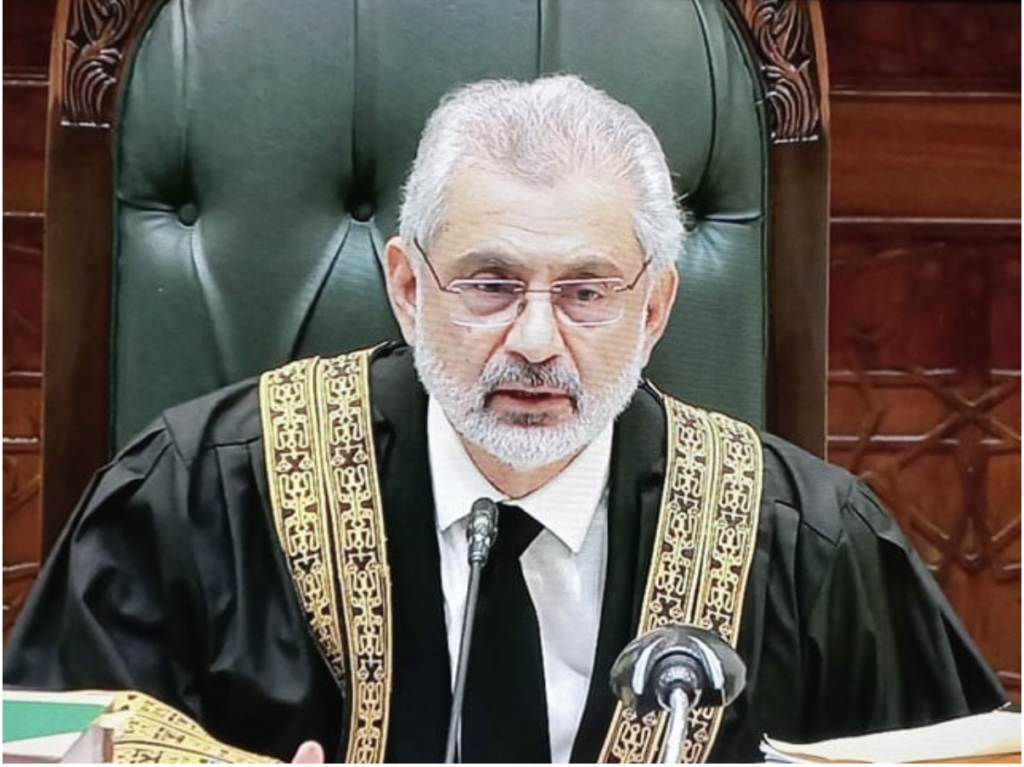ISLAMABAD:
The Supreme Court is so far showing restraint and not taking suo motu notice of the Rawalpindi Commissioner Liaquat Ali Chatha’s allegation that Chief Justice of Pakistan Qazi Faez Isa was involved in rigging this year’s general elections.
It has been learnt that no meeting of top court judges were held.
However, senior SC judges informally consulted among themselves after the Rawalpindi commissioner’s claim.
Some of them suggested taking suo motu notice of his allegation and the matter should be scheduled before a larger bench for adjudication but this proposal was turned down.
Later, CJP Isa talked to some media personnel at the SC premises, wherein he expressed his surprise over the “baseless” allegation levelled by the Rawalpindi commissioner.
Former additional attorney general (AAG) Tariq Mahmood Khokhar believed that the commissioner’s unsubstantiated assertions against the CJP were despicable and ludicrous.
He added that the CJP’s extra-judicial public comments to the media were “gratuitous” and did not constitute an authoritative or judicial ruling.
“Therefore not much should be read into this,” he continued.
Khokhar said his personal view was that judges should remain isolated from the public controversies.
“Judicial silence would perhaps have been more appropriate.”
He further explained that the causality of the Rawalpindi commissioner’s rant against the CJP had its roots in the judicial decisions involving the PTI electoral symbol of the ‘cricket bat’ as well as its founding chairman Imran Khan’s several successive criminal convictions and custodial sentences.
“There is a perception among a significant part of the nation that historically, the Supreme Court has been and remains a threat to democracy.”
Although the SC did not take a suo motu notice, a three-judge bench, led by CJP Isa, will take up a former military officer’s petition seeking a declaration that February 8 general elections were rigged and urging for a fresh round of the polls.
Now a debate is under way as to whether or not CJP Isa should be a part of the bench hearing the plea on polls rigging.
Lawyer Shoaib Shaheen, who contested the recent elections as a PTI-backed independent candidate, has also written a letter to CJP Isa about the alleged rigging in his constituency.
Senior lawyers believed that the SC should order a probe into the allegations of rigging in the elections.
Since the time of the British rule, districts including Attock, Chakwal, and Jhelum in Rawalpindi have been recognised as significant sources of military recruits, with soldiers hailing from these areas participating in both the world wars.
Moreover, even after the Partition, a majority of young people from these regions have shown a preference for joining the armed forces of Pakistan.
In the 2018 general elections, the PTI celebrated victories in the majority of the National Assembly seats in the Rawalpindi division and Islamabad Capital Territory (ICT), as the PML-N lost all of them in these areas.
However, the February 8 general elections brought a surprising turn of events, with the PTI failing to retain any seats in this historically significant region.
Allegations of massive rigging in the final results have already been raised by the PTI-backed independent candidates, particularly concerning the issuance of Form 47 by the Election Commission of Pakistan (ECP).
Many candidates have argued that the results indicating their victories had been collected through Form 45, distributed by presiding officers to their agents after the counting at polling stations.
Interestingly, a majority of PTI candidates in these districts enthusiastically celebrated the unofficial results on the night of February 8.
However, the scenario took a turn when the returning officers (ROs) issued Form 47, showing the defeat of PTI-backed independent candidates and declaring PML-N contestants as successful in these constituencies.
The PTI-backed candidates are alleging that they were denied entry into the ROs’ offices during the counting process.
Legal experts believed that the SC became controversial after its January 13 order wherein the PTI’s internal polls were declared as illegal and the party was deprived of its popular electoral symbol.
Now the PTI is struggling to secure its mandate and allocation of reserved seats on account of the SC’s January 13 order.
The PTI candidates were consistently complaining about not being given a level playing field to them during the elections but their grievances were not addressed.
Even after the January 13 order, the PTI was disappointed and withdrew its contempt petition over the violation of the court order for providing a level playing field to the party.
PTI founding chairman Imran was awarded convictions in three cases within a week.
There are serious doubts on the fairness of Imran and his wife Bushra Bibi’s trials in the Toshakhana reference and Iddat case. The former premier and PTI vice chairman Shah Mahmood Qureshi’s jail trial in the cipher case is also dubious.
According to Article 225 of the Constitution, election disputes can exclusively be addressed by tribunals but this process is time-consuming.
Furthermore, with the current accusation of widespread rigging, the tribunals will only address individual cases.
The crucial factor determining the legacy of CJP Isa lies in the conduct of free and fair elections.
While he played a role in ensuring that the general elections were held, questions have arisen about the fairness of the process.
The superior judiciary has been on trial since the Panama Papers case — with lingering doubts about political leaders receiving convictions during periods of strained relationships with the ‘powerful circles’.











